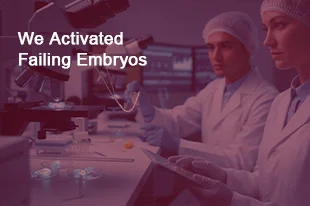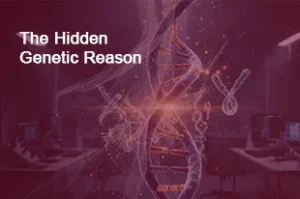
How Long Should You Wait Before Seeing a Fertility Specialist
Most couples think they have more time.
They start trying, and the first few months feel light — full of excitement and small rituals. They circle dates, check apps, imagine baby names. When nothing happens, they try harder. They Google harder. They wait.
And then waiting turns into wondering.
Is something wrong with us? Should we get checked? Or are we just being impatient?
This is the moment that breaks most people — not the result, but the confusion about when to ask for help.
Let’s talk about it honestly.
What’s “Normal” When You’re Trying
In a healthy couple under 30, the chance of getting pregnant in any single month is about 25%. That means it’s completely normal for conception to take several months.
But here’s the catch: “normal” doesn’t mean you should wait forever. The body gives quiet signals long before it gives you results.
If you’ve been trying for:
-
12 months and you’re under 35, or
-
6 months and you’re over 35 —
…it’s time to see a fertility specialist.
That’s not panic. That’s smart timing. It’s choosing clarity over guessing.
Why Timing Matters
Every month is an opportunity, but it’s also a clock.
Egg quality declines with age. Sperm motility changes. Hormones fluctuate. Stress builds. By the time most couples finally book an appointment, a year or two has passed — and with it, valuable time that could have made a difference.
As a trusted Fertility Hospital in Chennai, ARC Fertility Hospitals hear thousands of couples say the same thing: “We wish we came earlier.”
Because earlier doesn’t always mean treatment. Sometimes it just means understanding.
What Happens When You See a Fertility Specialist Early
It’s not as intimidating as people imagine. No one rushes you into IVF. No one blames you for waiting.
Your doctor will start with basic checks:
-
Hormone tests to see if you’re ovulating properly.
-
Ultrasound scans to check the uterus and ovaries.
-
A semen analysis for your partner to assess count and quality.
-
Simple tracking of your ovulation pattern.
Sometimes, it’s just a matter of timing. You might be ovulating earlier or later than you think. In that case, a doctor-guided Timed Intercourse plan might be all you need.
If there’s a deeper reason — like blocked tubes, PCOS, Ogliospermia, or low sperm count — we move toward solutions that match the cause.
That’s the point of coming early. You understand what’s happening before stress and time make things harder.
When to Stop Waiting
Most couples wait because they’re scared of the word infertility.
It feels heavy, final. But infertility is not a verdict. It’s just a medical term for “taking longer than expected.”
Waiting endlessly can cost you more than time. It chips away at your peace. It builds tension between partners. It creates guilt that doesn’t belong to either of you.
If you’ve been trying for months and every cycle ends the same, stop repeating the same pattern. Get guidance. Find out what’s really happening.
Because sometimes, it’s fixable in days — not years.
Don’t Compare Timelines
Every couple’s journey is different.
Some conceive in two months. Some take two years.
But comparing your story with someone else’s only builds unnecessary shame.
There are dozens of factors that shape fertility — hormones, weight, sleep, diet, even small infections. What worked for your friend might not work for you, and that’s okay.
Your journey doesn’t need to match anyone’s. It just needs to move forward.
When “Waiting” Is Just Fear
The truth is, most couples don’t delay because they don’t know the timeline. They delay because they’re scared of the results.
They’d rather keep hoping than face a report that confirms their fear.
But what if that report brings answers instead of heartbreak?
Every day at ARC Fertility Hospital in Chennai, we meet people who tell us, “We thought it would be bad news.”
And most of the time, it’s not.
Sometimes, it’s a small hormonal imbalance. Sometimes, it’s timing. Sometimes, it’s just exhaustion.
But even when the cause is complex, knowing is still better than not knowing. Because knowing means there’s something we can do.
When to Act Faster
You shouldn’t wait a full year if:
-
Your periods are irregular or painful.
-
You’ve had pelvic infections or endometriosis.
-
You’ve had multiple miscarriages.
-
You or your partner had previous fertility-related issues.
-
You’re over 35.
Fertility doesn’t disappear overnight, but it does fade slowly. Early testing catches that before it becomes a wall instead of a hurdle.
What Waiting Costs
Every couple thinks they can handle waiting until they realize what it’s doing to them.
The sleepless nights. The quiet fights. The birthdays you start to dread because you thought you’d have a baby by now.
Waiting is heavier than it looks.
But once you walk into that consultation room, something shifts. You stop feeling like you’re in the dark. You get answers — or at least direction.
That moment — that’s when waiting turns into moving.
The Real Message
You don’t go to a fertility specialist because you’ve failed. You go because you’re ready to stop guessing.
It’s not about rushing treatment. It’s about giving your body a chance to be understood, properly and early.
At ARC Fertility Hospital in Chennai, we see early consultations as empowerment, not emergency. You get your facts, you make a plan, and you move forward with peace — whatever the next step looks like.
So if you’re asking yourself, “How long should we wait?”
Maybe that’s your answer already.
You’ve waited long enough.

